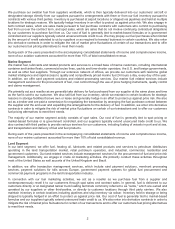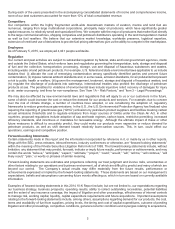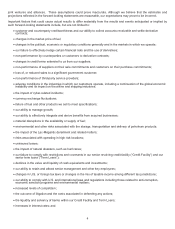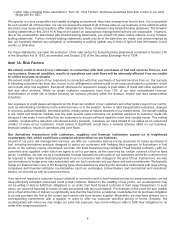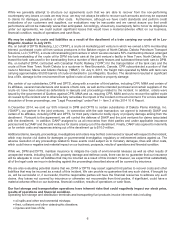World Fuel Services 2014 Annual Report Download - page 17
Download and view the complete annual report
Please find page 17 of the 2014 World Fuel Services annual report below. You can navigate through the pages in the report by either clicking on the pages listed below, or by using the keyword search tool below to find specific information within the annual report.12
retaining business and the U.K. Anti Bribery Act prohibits bribery both in the United Kingdom and internationally, as well as
bribery across public and private sectors. As part of our business, we regularly deal with state owned business enterprises,
the employees of which may be considered foreign officials for purposes of the FCPA. In addition, some of the international
locations in which we operate lack a developed legal system and have higher than normal levels of corruption. Our activities
in these countries create the risk of improper payments or offers of payments by one of our employees or other parties
acting on our behalf.
Furthermore, economic sanctions programs are complex, restrict our business dealings with certain countries and
individuals, and are constantly changing. Further restrictions may be enacted, amended, enforced or interpreted in a
manner that materially impacts our operations. From time to time, certain of our subsidiaries have limited business dealings
in countries subject to comprehensive OFAC administered sanctions, specifically Cuba, Iran, Syria and Sudan. These
business dealings, which represent an insignificant amount of our consolidated revenues and income, generally consist of
the purchase of overflight permits and the provision of flight support and fuel services pursuant to licenses issued by OFAC
or as otherwise permitted by U.S. sanctions regulations. As a result of the above activities, we are exposed to a heightened
risk of violating anti-corruption laws and OFAC regulations. Violations of these regulations are punishable by civil penalties,
including fines, denial of export privileges, injunctions, asset seizures, debarment from government contracts and
revocations or restrictions of licenses, as well as criminal fines and imprisonment.
We have established policies and procedures designed to assist with our compliance with applicable U.S. and international
laws and regulations. However, there can be no assurance that our policies and procedures will effectively prevent us from
violating these regulations in every transaction in which we may engage, and such a violation could adversely affect our
reputation, business, financial condition, results of operations and cash flows. In addition, such a violation could also cause
an event of default under our Credit Facility, which if not waived, could adversely affect our business, financial condition,
results of operations and cash flows. Finally, various state and municipal governments, universities and other investors
maintain prohibitions or restrictions on investments in companies that do business with sanctioned countries, which could
adversely affect the market for our securities.
On December 8, 2009, we received an administrative subpoena from OFAC requesting information regarding our
transactions involving Sudanese overflight payments since June 30, 2008. We responded to the subpoena and identified a
small number of sanctioned country related transactions which took place after our license had expired that may have
resulted in violations of U.S. sanctions regulations or our OFAC issued license. In our response to OFAC, we noted that the
transactions we identified as potential violations resulted in very small amounts of revenue to us. We have also taken various
remedial actions to further strengthen our compliance related policies and procedures. Nevertheless, should OFAC
determine that these activities constituted violations of U.S. sanctions regulations, civil penalties, including fines, could be
assessed against us. Additionally, in the course of its ongoing review, OFAC could request additional information from us,
in the form of additional subpoenas or otherwise, and we intend to fully cooperate with any such additional subpoenas or
requests. We cannot predict the ultimate outcome of the OFAC review, the total costs to be incurred in response to this
review, the potential impact on our personnel, the effect of implementing any further measures that may be necessary to
ensure full compliance with U.S. sanctions regulations or to what extent, if at all, we could be subject to fines, sanctions or
other penalties.
If we are unable to retain our senior management and key employees, our business and results of operations could
be harmed.
Our ability to maintain our competitive position is largely dependent on the services of our senior management and key
personnel. Although we have employment or severance agreements with certain of our key employees, these agreements
do not prevent those individuals from ceasing their employment with us at any time. If we are unable to retain existing senior
management and key personnel, or to attract other qualified senior management and key personnel on terms satisfactory
to us, our business could be adversely affected. While we maintain key man life insurance with respect to certain members
of senior management, our coverage levels may not be sufficient to offset any losses we may incur and there is no assurance
that we will continue to maintain key man life insurance in the future.
Our failure to comply with the requirements of our Credit Facility and Term Loans could adversely affect our
operating flexibility.
We have the ability to borrow money pursuant to a Credit Facility and Term Loans that impose certain operating and financial
covenants on us, which restrict our ability to (i) pay dividends, (ii) incur additional debt, (iii) create liens, (iv) make restricted
payments, (v) sell assets and (vi) engage in mergers or acquisitions. Our failure to comply with the requirements of these
facilities, including meeting certain financial ratios or other covenants, could result in an event of default. An event of default,
if not cured or waived, would permit acceleration of any outstanding indebtedness under these facilities, could trigger cross
defaults under other agreements to which we are a party (such as certain derivative contracts), and would impair our ability


